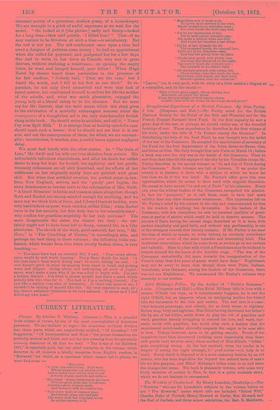Struggles and Experiences of a Neutral Volunteer. By John Farley.
2 vols. (Chapman and Hall.)—Mr. Farley acted for the British National Society for the Relief of the Sick and Wounded and for the French Peasant Farmers' Seed Fund. In the first capacity he saw a great deal of the war, or perhaps we should rather say, of the dreadful footsteps of war. These experiences he describes in the first volume of his work, under the title of "In France among the Germans." In distributing the help of the Seed Fund, he was brought into the midst of the war of the Commune. He accepted the appointment of secretary of the Fund for the four departments of the Seine, Seine-et-Marne, Oise, and Seine-et-Oise. His duty brought him into Paris on March 14 ; before a week was over the city was in the hands of the Commune. What he saw from that time till the capture of the city by the Versailles troops Mr. Furley describes in his second volume as "In and Out of Paris daring the Commune." Beth volumes are fall of interest. If we prefer the second, it is because it deals with a subject of which we know far less than we do of the war itself. Mr. Furley's office gave him rare opportunities, which he seems to have used with singular discretion. He seems to have moved "in and out of Paris "at his pleasure. Every one, even the wildest leaders of the Commune, recognised his mission. In fact his passports," so to call them, seem to have had more validity than any other documents whatsoever. The impression left on Mr. Furley's mind by his sojourn in the city and communicated by him to his readers is anything but favourable. In the leaders of the Commune, with few exceptions, he saw no personal qualities of great- ness or purity of motive which could be held to deserve success. The picture of.Paris during the second siege, described as it is here, with perfect simplicity and good faith, and without any partisanship, is one of the strangest records that history contains. If Mr. Furley is too near the time of which he speaks to write history, he certainly contributes mbnoires pour servir of the most valuable and interesting kind. The incidental observations which he notes down as events go on are carious and valuable. Here is a fact with which a Frenchman may be inclined to console himself for the losses of the horrible siege. "The war of the Commune undoubtedly did more towards the reorganisation of the French army than five years of peace would have done." Englishmen may not be sorry to learn that though there were Poles, Italians,. Americans, even Germans, among the leaders of ther Commune, there was not one Englishman. We recommend Mr. Farley's volumes very sincerely to our readers.


































 Previous page
Previous page